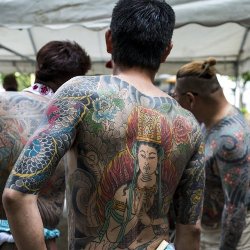Yakuza Looking to Infiltrate Japanese Casino Industry

Japan’s casino bill seems to be progressing smoothly through the legislature, and after sailing through the Cabinet Committee of the House of Councillors on Thursday is expected to clear parliament during a full upper house session later today. The Government of Shinzo Abe view casinos as a valuable means of attracting more foreign tourists to Japan, and according to Morgan Stanley the industry could generate around $15 billion a year by 2025, with the government subsequently collecting 30% of all revenues by way of taxes.
Needless to say, international casino companies such as Las Vegas Sands, Wynn Resorts, MGM Resorts, and Melco Resorts & Entertainment have been keeping a close eye on developments, and are hoping to be first in line when bidding for a Japanese casino license. In the meantime, however, the potentially lucrative industry is also attracting attention from a less wanted group, namely the country’s transnational organized crime syndicates known as the Yakuza.
Organized Crime
The Yakuza have a history in Japan dating back to the 17th century, and currently boasts more than 100,000 members, many of whom are distinguished by their distinct tattoos which reflect symbolism, imagery, art and culture. News of the Yakuza’s interest in Japan’s casino industry was first revealed in an article published in reputable newspaper Ashai Shinbun (AS).
Its source is described as a high-ranking member affiliated with the Yamaguchi-gumi Yakuza, which is Japan’s largest yakuza group with over 20,000 members, as well as an equivalent number of associates. As he then explains:
“Once rules are decided on how to place restrictions on organized crime, we can begin thinking about ways to get around those legal barriers.”
Areas Ripe For Exploitation
According to the gang member, the organization may seek to be in on the industry from the very start, and become subcontractors on major construction projects. Once an integrated casino opens for business, the criminal organization can then exploit the venue by planting crooked dealers who will allow its gang members to win at the tables.
Meanwhile, high roller gamblers can be exploited by the organization providing them with shady loans, and as the Yakuza member states:
“By providing hotel accommodations and airline tickets for VIPs, we can then lend them money at exorbitant interest rates. There is no way we would lose money.”
Japan’s casino bill also requires people to pay an entrance fee, and places restrictions on the amount of times they can enter a casino each month. Apparently, this is another area ripe for exploitation by the gang as once people start enjoying the casino experience, they will become more open to visiting illegal casinos that do not charge admittance fees, or place restrictions on the frequency of visits each month.
Taking Protective Steps
The casino oversight committee has said that it would closely be examining all potential casino operators in order to ensure they possess sufficient social trust, and that their reputations are beyond question. On July 11, Japan also implemented its new anti-terrorism and organized crime law that grants it greater authority to monitor and punish gang members. Nevertheless, this has subsequently led to a greater effort by Yakuza to conceal their gang affiliation, which has been taken as a clear sign by the Police Department that the criminal enterprise is preparing to infiltrate the country’s new casino industry.
Some companies and hotel chains have already started looking in greater detail at their employees, and are taking steps to uncover and dismiss anyone with links to organized crime. Tokyo-based firm Security Protection Network Co, for instance, has been receiving an upsurge in requests from companies looking to assess whether their staff members have any connection to anti-social elements.
That said, the company vice president, Tsunehito Haga explains that such checks are usually time consuming and expensive, which may deter operators from doing a thorough vetting of all their staff. Haga further stated:
“It is still unclear how thoroughly private companies will implement measures, such as restricting casino visits and dealing with shady dealers, because there is always the possibility that potential customers may stay away if the measures become too strict.”
Finally, a Casino Oversight Committee will be set up to help monitor the industry, and ensure that it adheres to the law, while the government is planning on expending vast amounts of time and money on state-of-the-art technology, such as facial and fingerprint recognition technology, in order to combat the Yakuza.








